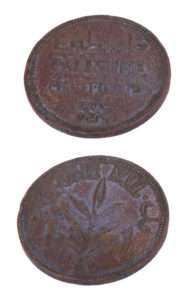
This summer at my church, I taught a five-week series on Significant Women from the Bible. If I’d had one more week, I would have loved to teach about the woman in Mark 12. Jesus made her a teaching lesson for his disciples. Not a long lecture, not many details, not even her name—just an observation that escaped everyone—except Jesus.
“Jesus sat down opposite the place where the offerings were put and watched the crowd putting their money into the temple treasury. Many rich people threw in large amounts. But a poor widow came and put in two very small copper coins, worth only a fraction of a penny. Calling his disciples to him, Jesus said, ‘I tell you the truth, this poor widow has put more into the treasury than all the others. They all gave out of their wealth; but she, out of her poverty, put in everything—all she had to live on.’” Mark 12:41-44
The curious onlookers nod in hushed admiration as coins rattle into the trumpet-shaped boxes. Out of their abundance the wealthy contribute to the treasury, their display of generosity well noted.
No one pays attention to the poor widow in the crowd. Her two small coins make barely a ding as she drops them in anonymously. Two lepta, worth 1/64 of a day’s wage, an invisible deed with no means to impress. On the surface her measly gift pales in comparison to those who preceded her. But unlike the rest of us, Jesus never calculates at face value. In his estimation this unnamed woman raises the bar on giving.
A teaching opportunity presents itself for twelve dull-witted disciples. Impoverished widows normally clutch tightly whatever money they have. But this one releases it all, everything she has to live on. The eyes of the world can’t see the impact, or smell the fragrant offering. Jesus then teaches a principle from his Father’s course on economics:
“This poor widow has put more into the treasury than all the others”
Call it new math or something else, Jesus is letting us in on his Father’s accounting system. He has a different way of measuring.
The disciples keep quiet, giving no hint of their reaction. I too feel silenced by her deed, stuffing the temptation to suggest more prudent money management. I would like to lessen the magnitude of her deed by assuming her advanced age and impending death, but the text does not allow for that interpretation. And neither does Jesus.
Her action reveals what she believes about God and about money. She isn’t worried that her stomach will never be filled with bread again. The birds flying overhead provide evidence of that. Money serves as just another way to love God with all her heart and soul, putting the great commandment on display for all of us.
The curious onlooker within me now stands rebuked with no way of escape. Her meager extravagance nails me, and I nod in hushed admiration.
I’d love to hear your thoughts on this significant woman.


Oh, Janet, I have never really understood this lesson. I, too, have wondered about her planning and sensibility. You have opened my eyes to see that her act was a demonstration of her love, trust and obedience to God. She didn’t complicate her giving but simply obeyed the command to love God with ALL her heart, mind, soul and strength. Now I see it in a whole different light. Thank you for helping me get this. Now I am “nailed” also and nod with you.
Hi Richie, This story gives us much to think about and meditate on. I love when Jesus pulls someone out of obscurity and makes them an object lesson. The perfume lady is another favorite, 2 chapters over in 14:3-9. She too loved Jesus lavishly and gave her all, but in a different way. Each of us have unique ways to love God and to give everything to him.